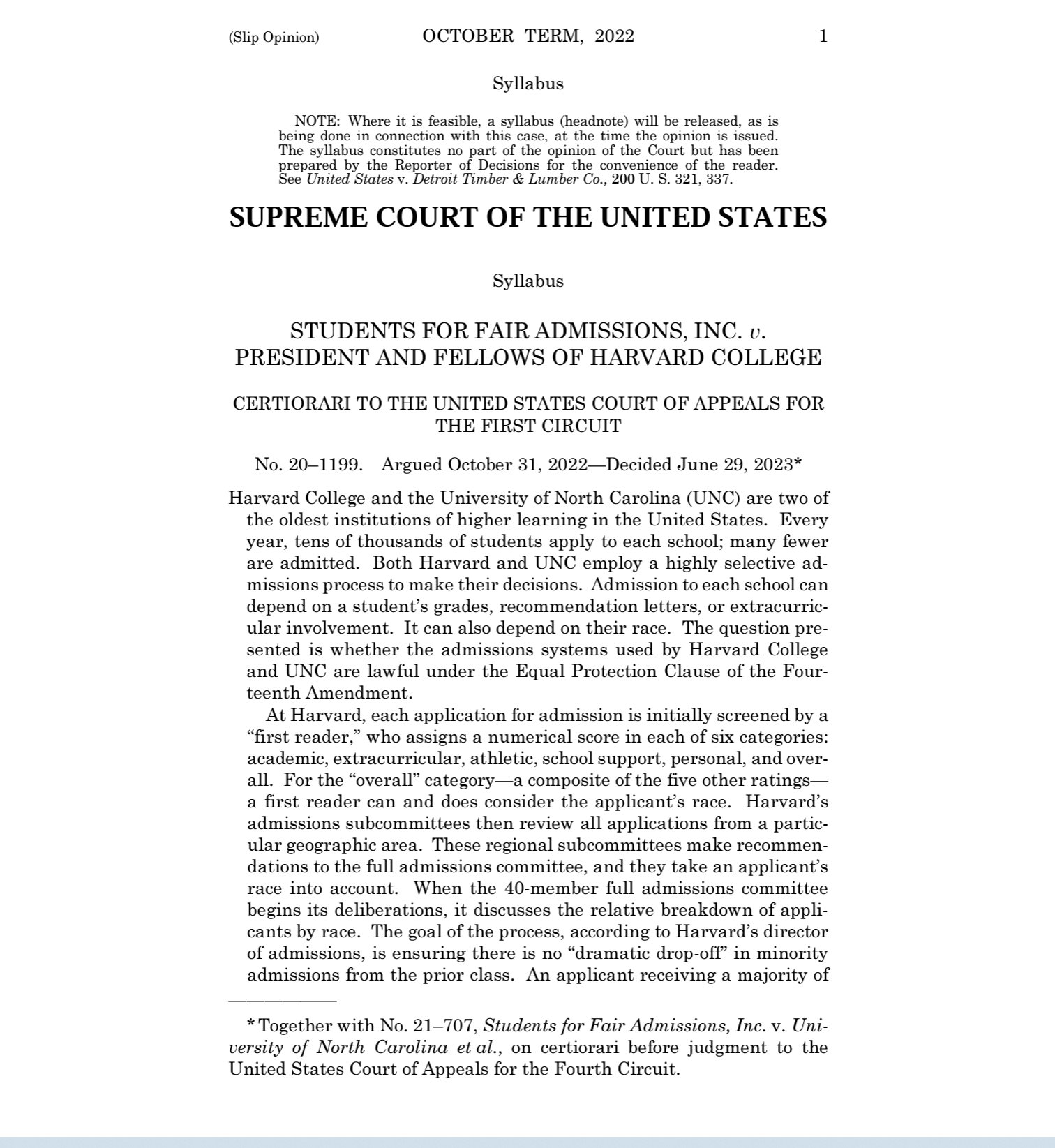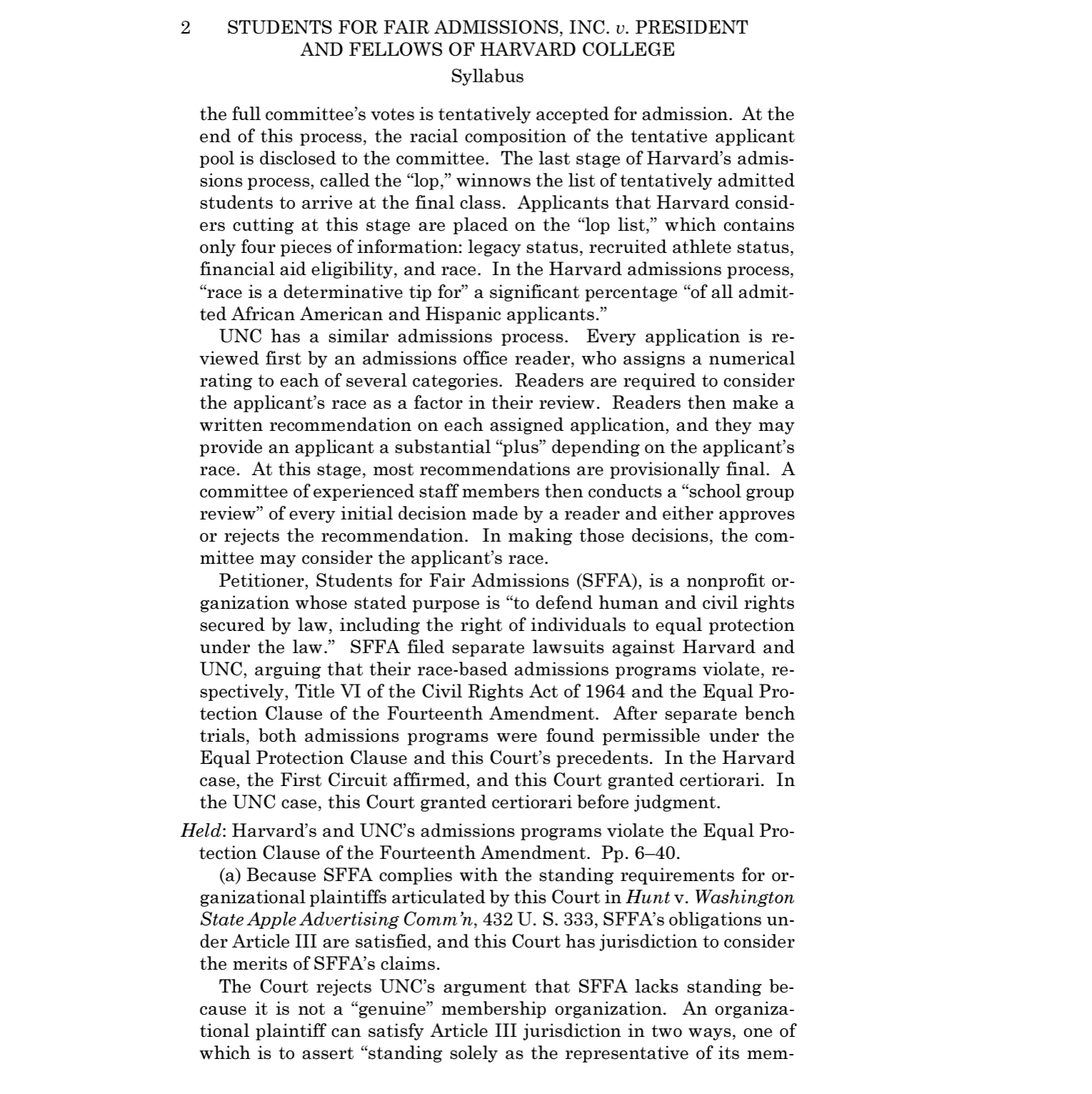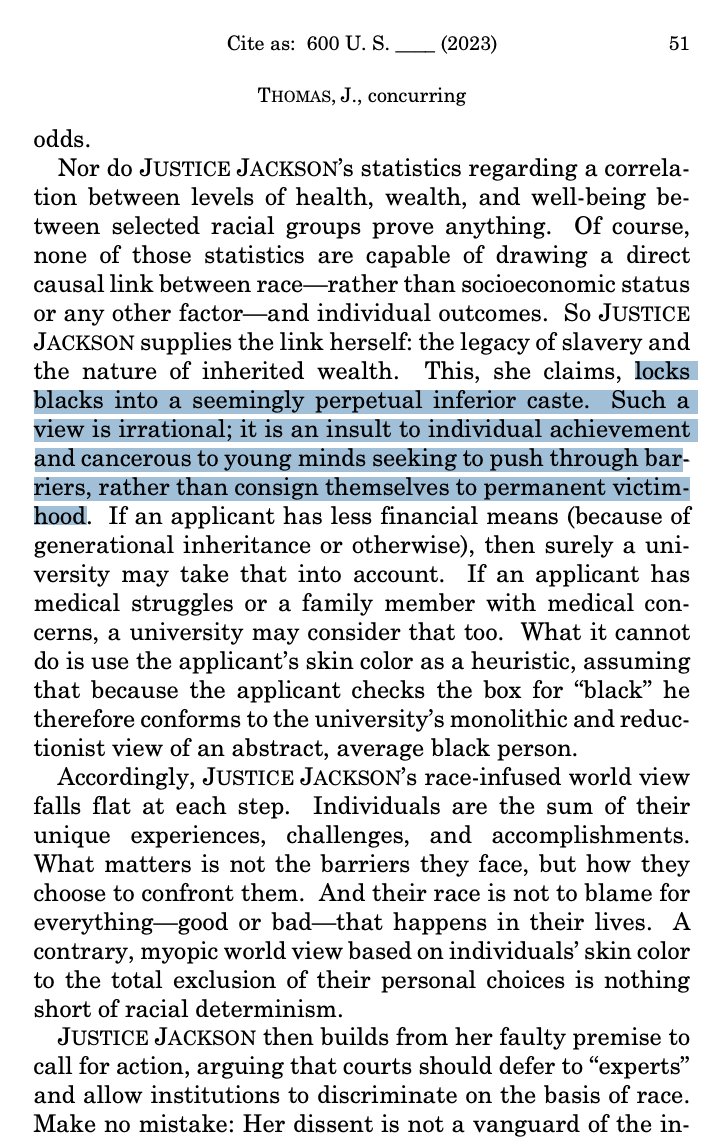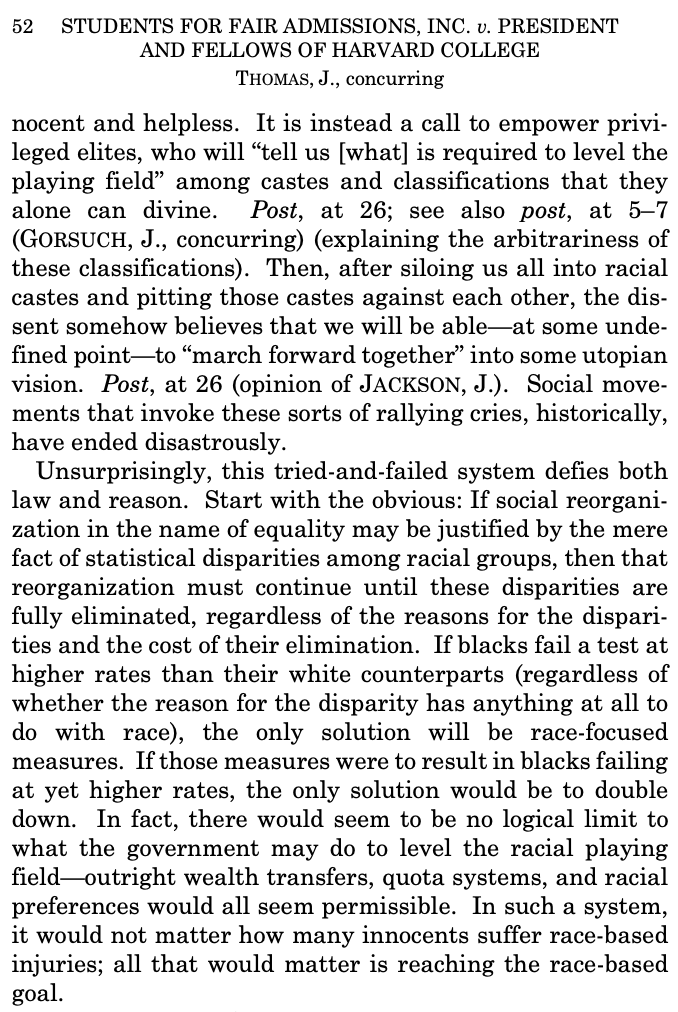The U.S. Supreme Court on Thursday struck down admissions programs at Harvard University and the University of North Carolina that relied partly on racial considerations.
The high court ruled 6-3 that the admissions programs are unconstitutional.
Universities can no longer consider the race of applicants for admission.
According to Chief Justice John Roberts, the admissions programs violate the Equal Protection Clause of the Fourteenth Amendment.
Chief Justice John Roberts wrote the opinion for the 6-3 ruling banning affirmative action in college admissions
The Harvard and UNC admissions programs violate the Equal Protection Clause of the Fourteenth Amendment, according to Robertshttps://t.co/U16w4ml464 pic.twitter.com/ExunsE0WL7
— Nick Sortor (@nicksortor) June 29, 2023
NEW — Supreme Court restricts use of race in college admissions
“The Supreme Court on Thursday struck down admissions programs at Harvard and the University of North Carolina that relied in part on racial considerations, saying they violate the Constitution.”… pic.twitter.com/ul14HDycPw
— Chief Nerd (@TheChiefNerd) June 29, 2023
“The student must be treated based on his or her experiences as an individual—not on the basis of race,” Roberts wrote.
“Many universities have for too long done just the opposite. And in doing so, they have concluded, wrongly, that the touchstone of an individual’s identity is not challenges bested, skills built, or lessons learned but the color of their skin. Our constitutional history does not tolerate that choice,” he added.
The Washington Post noted that the ruling fell along ideological lines, with the liberal-leaning justices dissenting.
From The Washington Post:
As recently as 2016, the court upheld an affirmative action program at the University of Texas, concluding for the third time that educational diversity justifies the consideration of race as one factor in admission decisions.
But Justice Sonia Sotomayor is the only justice remaining on the court from that slim 4-3 majority. At the time, conservative activist Edward Blum, who brought previous challenges to the practice, was already working on new lawsuits he could present to a rebuilt court.
In the North Carolina case, his group Students for Fair Admissions said the flagship university’s policies discriminated against White and Asian applicants by giving preference to Black, Hispanic and Native American ones.
The case against Harvard accused the university of discriminating against Asian American students by employing subjective standards to limit the numbers accepted.
Challengers say that under the equal protection clause, government-run universities like UNC cannot use race as a factor in admissions decisions. Harvard is not subject to that constitutional clause, but must adhere to Title VI of the Civil Rights Act of 1964. That statute prohibits racial discrimination in the exclusion or denial of benefits under “any program or activity receiving Federal financial assistance.”
🚨 BREAKING: SCOTUS strikes down Harvard and UNC affirmative action programs, outlaws consideration of race as a factor in college admissions
— Benny Johnson (@bennyjohnson) June 29, 2023
By a vote of 6-3, the Supreme Court just ruled that university admissions programs that use affirmative action and other race-based admissions criteria are unconstitutional and violate the 14th Amendment. Roberts wrote the opinion. https://t.co/k5ZBSlUh12 pic.twitter.com/Yf5ReefNVY
— Sean Davis (@seanmdav) June 29, 2023
“I hope conservatives understand that the SCOTUS affirmative action decision on university admissions is the beginning of the war, not the end,” co-founder of The Federalist Sean Davis wrote.
“The university cartel, which is responsible for much of the DEI nonsense being foisted on the country from every major institution of power, is not going to just stop being racist. Identity-based exclusion is built into the firmware of the college credentialing machine.”
I hope conservatives understand that the SCOTUS affirmative action decision on university admissions is the beginning of the war, not the end.
The university cartel, which is responsible for much of the DEI nonsense being foisted on the country from every major institution of…
— Sean Davis (@seanmdav) June 29, 2023
“Of course Jackson dissents from the view that admission based on race is illegal: the only reason she has her current job is because of race-based admissions criteria,” Davis wrote regarding Justice Ketanji Brown Jackson’s dissenting opinion.
Of course Jackson dissents from the view that admission based on race is illegal: the only reason she has her current job is because of race-based admissions criteria. https://t.co/UbARPzr7Nt pic.twitter.com/LDyyABjNTa
— Sean Davis (@seanmdav) June 29, 2023
Justice Clarence Thomas commented on Jackson’s dissenting opinion.
Jackson “locks blacks into a seemingly perpetual inferior caste. Such a view is irrational; it is an insult to individual achievement and cancerous to young minds seeking to push through barriers, rather than consign themselves to permanent victimhood,” he wrote.
Justice Clarence Thomas blasts Justice Ketanji Brown Jackson's arguments in his concurrence:
KBJ "locks blacks into a seemingly perpetual inferior caste. Such a view is irrational; it is an insult to individual achievement and cancerous to young minds seeking to push through… pic.twitter.com/c3fUQPWETP
— Steve Guest (@SteveGuest) June 29, 2023
From The Hill:
Justice Ketanji Brown Jackson lashed out at the Supreme Court’s majority opinion on affirmative action in college admissions, with a dissent asserting that it will not bring a quicker end to racism.
“The best that can be said of the majority’s perspective is that it proceeds (ostrich-like) from the hope that preventing consideration of race will end racism. But if that is its motivation, the majority proceeds in vain,” Jackson wrote.
Jackson recused herself from one of the two cases heard by the court, involving Harvard, because of her role with the institution’s governing board as a lower court judge. Her opinion was confined to the University of North Carolina case.
Read the full opinions HERE.







Join the conversation!
Please share your thoughts about this article below. We value your opinions, and would love to see you add to the discussion!